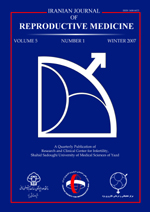
|
International Journal of Reproductive BioMedicine
Research and Clinical Center for Infertility, Shahid Sadoughi University of Medical Sciences of Yazd
ISSN: 1680-6433
EISSN: 1680-6433
Vol. 14, No. 7, 2016, pp. 453-458
|
 Bioline Code: rm16057
Bioline Code: rm16057
Full paper language: English
Document type: Research Article
Document available free of charge
|
|
|
International Journal of Reproductive BioMedicine, Vol. 14, No. 7, 2016, pp. 453-458
| en |
The effect of endometrial injury on pregnancy rate in frozen-thawed embryo transfer: A randomized control trial
Aflatoonian, Abbas; Bagheri, Ramesh Baradaran & Hosseinisadat, Robabe
Abstract
Background: Implantation failure is one of the most important factors limiting success in IVF treatment. The majority of trials have demonstrated favorable effect of endometrial injury on implantation success rate especially in women with recurrent implantation failure, while some studies failed to detect any benefit.
Objective: The purpose of our trial was to explore whether endometrial injury in luteal phase prior to frozen-thawed embryo transfer cycles would improve pregnancy outcomes?
Materials and Methods: We conducted a prospective controlled trial of 93 consecutive subjects at a research and clinical center for infertility. All women were undergone frozen-thawed embryo transfer (FTE) cycles. Women in the experimental group underwent endometrial biopsy with a Pipelle catheter in luteal phase proceeding FET cycle. Primary outcomes were implantation and clinical pregnancy rates and secondary outcomes were chemical, ongoing and multiple pregnancy and miscarriage rates.
Results: 45 subjects who underwent endometrial injury (EI) were compared with 48 control group which did not include any uterine manipulation. There were no significant differences in baseline and cycle characteristics between two groups. The difference in implantation rate was trend to statistically significance, 11.8% in EI group vs. 20.5% in control group (p=0.091). The chemical, clinical and ongoing pregnancy rates were lower in EI group compared with control group but not statistically significant. The multiple pregnancy rate and miscarriage rate also were lower in EI group compared with control group.
Conclusion: Based on results of this study, local injury to endometrium in luteal phase prior to FET cycle had a negative impact on implantation and clinical pregnancy rates.
Keywords
Endometrial injury; Frozen-thawed embryo transfer; Pipelle catheter; Implantation rate; Pregnancy rate
|
| |
© Copyright 2016 - Iranian Journal of Reproductive Medicine
Alternative site location: http://www.ijrm.ir
|
|
